stdClass Object
(
[id] => 16609
[title] => The satisfied West had lost hope
[alias] => the-satisfied-west-had-lost-hope
[introtext] => You fight the "not chosen hunger" by keeping alive in each person the "good hunger" of a "not yet"
by Luigino Bruni
published on Mondo e Missione, January 2012
 A personal experience. A few months ago I went on a trip to Kenya for lectures and conferences. Going around the country I saw, or rather glimpsed from a distance, many forms of poverty, misery, and even true hunger.
A personal experience. A few months ago I went on a trip to Kenya for lectures and conferences. Going around the country I saw, or rather glimpsed from a distance, many forms of poverty, misery, and even true hunger.
But the strongest image that I took with me, from encountering part of the African culture, was not that of emptiness, but of fullness. In particular, I was impressed to see many young people studying for exams crowded at night under the streetlights, because they had no electricity at home.
[fulltext] => I thought my students in Milan, slacking in their studies because they have lost that which motivates a young person towards life: the desire for the future, the hunger for life. As for poverty, there also exists a positive variation of the term hunger, which refers precisely to the lack of something I do not have, and motivates me to improve myself and the others.
After the war, Europe was capable of great things, that is to rebuild morally, civilly, and economically the countries destroyed by civil war between Christians, with millions of dead and rivers of debris, because those peoples had strong desire and need of finally building a new world. When this type of hunger is missing in persons and peoples (as happens in Europe today), it also becomes very difficult to deal seriously and effectively with the "negative hunger," which must be fought, for where there is no enthusiasm and desire to live, there can be no energy to take care of others. One fights hunger not by choice and suffers (from nature and/or others, from wars, bad relationships…), by keeping alive in persons the positive hunger of a "not yet," which we want to get to, and compel us to the commitment.
The West and its economic and social development model is showing all of its fragility, and not just because of finance, but a deficit in anthropology that has a lot to do with the absence of this positive hunger. If this “good hunger” is satisfied of life, which is an expression of a call to transcendence in each person, with goods and not with the cultivation of humanity and relationships, the most important asset of any economy and society becomes less in each person: wanting to get up in the morning to improve our lives.
If that better world that those young people of Kenya dream of is only the African version of this model of development, waking up from that dream will be dramatic, because it definitely will not be able to keep its promises.
Africa and other regions of the world are still only partly achieved by capitalism. Now they face the great challenge of giving birth to a market economy and a post-consumerist economic development, more communal and supportive, more in harmony with the environment, and less materialistic. We must avoid the deadly mistake of turning off the desire and hunger for life in young people, only filling the void with goods. The goods are important, sometimes essential, but they become "goods" when they do not extinguish the hunger of good things that are more important than merchandises.
[checked_out] => 0
[checked_out_time] => 0000-00-00 00:00:00
[catid] => 891
[created] => 2012-01-03 09:44:54
[created_by] => 64
[created_by_alias] => Luigino Bruni
[state] => 1
[modified] => 2020-08-23 20:58:47
[modified_by] => 609
[modified_by_name] => Super User
[publish_up] => 2012-01-03 09:44:54
[publish_down] => 0000-00-00 00:00:00
[images] => {"image_intro":"","float_intro":"","image_intro_alt":"","image_intro_caption":"","image_fulltext":"","float_fulltext":"","image_fulltext_alt":"","image_fulltext_caption":""}
[urls] => {"urla":false,"urlatext":"","targeta":"","urlb":false,"urlbtext":"","targetb":"","urlc":false,"urlctext":"","targetc":""}
[attribs] => {"article_layout":"","show_title":"","link_titles":"","show_tags":"","show_intro":"","info_block_position":"","info_block_show_title":"","show_category":"","link_category":"","show_parent_category":"","link_parent_category":"","show_associations":"","show_author":"","link_author":"","show_create_date":"","show_modify_date":"","show_publish_date":"","show_item_navigation":"","show_icons":"","show_print_icon":"","show_email_icon":"","show_vote":"","show_hits":"","show_noauth":"","urls_position":"","alternative_readmore":"","article_page_title":"","show_publishing_options":"","show_article_options":"","show_urls_images_backend":"","show_urls_images_frontend":"","helix_ultimate_image":"","helix_ultimate_image_alt_txt":"","helix_ultimate_article_format":"standard","gallery":"","helix_ultimate_audio":"","helix_ultimate_video":"","link_title":"","link_url":"","quote_text":"","quote_author":"","post_status":""}
[metadata] => {"robots":"","author":"","rights":"","xreference":""}
[metakey] =>
[metadesc] =>
[access] => 1
[hits] => 7065
[xreference] =>
[featured] => 0
[language] => en-GB
[on_img_default] =>
[readmore] => 2577
[ordering] => 25
[category_title] => EN - Bruni various
[category_route] => economia-civile/it-editoriali-vari/it-bruni-varie
[category_access] => 1
[category_alias] => en-bruni-various
[published] => 1
[parents_published] => 1
[lft] => 83
[author] => Luigino Bruni
[author_email] => ferrucci.anto@gmail.com
[parent_title] => IT - Editoriali vari
[parent_id] => 893
[parent_route] => economia-civile/it-editoriali-vari
[parent_alias] => it-editoriali-vari
[rating] => 0
[rating_count] => 0
[alternative_readmore] =>
[layout] =>
[params] => Joomla\Registry\Registry Object
(
[data:protected] => stdClass Object
(
[article_layout] => _:default
[show_title] => 1
[link_titles] => 1
[show_intro] => 1
[info_block_position] => 0
[info_block_show_title] => 1
[show_category] => 1
[link_category] => 1
[show_parent_category] => 1
[link_parent_category] => 1
[show_associations] => 0
[flags] => 1
[show_author] => 0
[link_author] => 0
[show_create_date] => 1
[show_modify_date] => 0
[show_publish_date] => 1
[show_item_navigation] => 1
[show_vote] => 0
[show_readmore] => 0
[show_readmore_title] => 0
[readmore_limit] => 100
[show_tags] => 1
[show_icons] => 1
[show_print_icon] => 1
[show_email_icon] => 1
[show_hits] => 0
[record_hits] => 1
[show_noauth] => 0
[urls_position] => 1
[captcha] =>
[show_publishing_options] => 1
[show_article_options] => 1
[save_history] => 1
[history_limit] => 10
[show_urls_images_frontend] => 0
[show_urls_images_backend] => 1
[targeta] => 0
[targetb] => 0
[targetc] => 0
[float_intro] => left
[float_fulltext] => left
[category_layout] => _:blog
[show_category_heading_title_text] => 0
[show_category_title] => 0
[show_description] => 0
[show_description_image] => 0
[maxLevel] => 0
[show_empty_categories] => 0
[show_no_articles] => 1
[show_subcat_desc] => 0
[show_cat_num_articles] => 0
[show_cat_tags] => 1
[show_base_description] => 1
[maxLevelcat] => -1
[show_empty_categories_cat] => 0
[show_subcat_desc_cat] => 0
[show_cat_num_articles_cat] => 0
[num_leading_articles] => 0
[num_intro_articles] => 14
[num_columns] => 2
[num_links] => 0
[multi_column_order] => 1
[show_subcategory_content] => -1
[show_pagination_limit] => 1
[filter_field] => hide
[show_headings] => 1
[list_show_date] => 0
[date_format] =>
[list_show_hits] => 1
[list_show_author] => 1
[list_show_votes] => 0
[list_show_ratings] => 0
[orderby_pri] => none
[orderby_sec] => rdate
[order_date] => published
[show_pagination] => 2
[show_pagination_results] => 1
[show_featured] => show
[show_feed_link] => 1
[feed_summary] => 0
[feed_show_readmore] => 0
[sef_advanced] => 1
[sef_ids] => 1
[custom_fields_enable] => 1
[show_page_heading] => 0
[layout_type] => blog
[menu_text] => 1
[menu_show] => 1
[secure] => 0
[helixultimatemenulayout] => {"width":600,"menualign":"right","megamenu":0,"showtitle":1,"faicon":"","customclass":"","dropdown":"right","badge":"","badge_position":"","badge_bg_color":"","badge_text_color":"","layout":[]}
[helixultimate_enable_page_title] => 1
[helixultimate_page_title_alt] => Economia Civile
[helixultimate_page_subtitle] => Bruni Varie
[helixultimate_page_title_heading] => h2
[page_title] => Bruni various
[page_description] =>
[page_rights] =>
[robots] =>
[access-view] => 1
)
[initialized:protected] => 1
[separator] => .
)
[displayDate] => 2012-01-03 09:44:54
[tags] => Joomla\CMS\Helper\TagsHelper Object
(
[tagsChanged:protected] =>
[replaceTags:protected] =>
[typeAlias] =>
[itemTags] => Array
(
)
)
[slug] => 16609:the-satisfied-west-had-lost-hope
[parent_slug] => 893:it-editoriali-vari
[catslug] => 891:en-bruni-various
[event] => stdClass Object
(
[afterDisplayTitle] =>
[beforeDisplayContent] =>
[afterDisplayContent] =>
)
[text] => You fight the "not chosen hunger" by keeping alive in each person the "good hunger" of a "not yet"
by Luigino Bruni
published on Mondo e Missione, January 2012
 A personal experience. A few months ago I went on a trip to Kenya for lectures and conferences. Going around the country I saw, or rather glimpsed from a distance, many forms of poverty, misery, and even true hunger.
A personal experience. A few months ago I went on a trip to Kenya for lectures and conferences. Going around the country I saw, or rather glimpsed from a distance, many forms of poverty, misery, and even true hunger.
But the strongest image that I took with me, from encountering part of the African culture, was not that of emptiness, but of fullness. In particular, I was impressed to see many young people studying for exams crowded at night under the streetlights, because they had no electricity at home.
[jcfields] => Array
(
)
[type] => intro
[oddeven] => item-odd
)







 We present to you the "2011 EoC Report," with gratitude - to God, to Chiara, the entrepreneurs, the commissions, and all the EoC actors; the report of among the most difficult year because of the global economies and certainly that of the West. We were astonished and rejoiced with the results of this difficult year. As you will see when you flip through the pages, the profits and the companies that are part of our grand project (it is called like this until we find a better word that best satisfy us) both have increased. But the quality of development projects in the world has also increase, brought ahead in an ever closer and effective collaboration with AMU, as well as the increase of communion with the people who received aid.
We present to you the "2011 EoC Report," with gratitude - to God, to Chiara, the entrepreneurs, the commissions, and all the EoC actors; the report of among the most difficult year because of the global economies and certainly that of the West. We were astonished and rejoiced with the results of this difficult year. As you will see when you flip through the pages, the profits and the companies that are part of our grand project (it is called like this until we find a better word that best satisfy us) both have increased. But the quality of development projects in the world has also increase, brought ahead in an ever closer and effective collaboration with AMU, as well as the increase of communion with the people who received aid. More than 40 delegates, including a dozen Muslims, church officials, economists and secular social activists met at the end of September 2011 in Kota Kinabalu, Malaysia to address the question of structural greed.
More than 40 delegates, including a dozen Muslims, church officials, economists and secular social activists met at the end of September 2011 in Kota Kinabalu, Malaysia to address the question of structural greed.
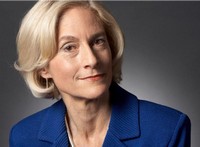 Loppiano (Florence) – Martha Nussbaum is among the fe
Loppiano (Florence) – Martha Nussbaum is among the fe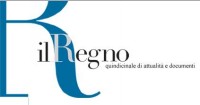 I read with joy about the important article of Prof. Severino Dianich in this magazine (
I read with joy about the important article of Prof. Severino Dianich in this magazine (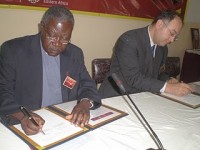 The main event of the convention’s last day was the signing of the “agreement” between the Economy of Communion and Catholic University (CUEA) to develop the EoC together in the next few years. It was a solemn, strong, symbolic moment, full of meaning. The previous day, the Nuncio had celebrated liturgy with the whole university, and even if I don’t know what the liturgies of the first Christians at Antioch were like, neither those of Francis of Assisi, and I have never seen a liturgy in the Andes or in Australia, it’s truly hard to imagine that there can be any masses more beautiful than the ones I’ve seen here.
The main event of the convention’s last day was the signing of the “agreement” between the Economy of Communion and Catholic University (CUEA) to develop the EoC together in the next few years. It was a solemn, strong, symbolic moment, full of meaning. The previous day, the Nuncio had celebrated liturgy with the whole university, and even if I don’t know what the liturgies of the first Christians at Antioch were like, neither those of Francis of Assisi, and I have never seen a liturgy in the Andes or in Australia, it’s truly hard to imagine that there can be any masses more beautiful than the ones I’ve seen here.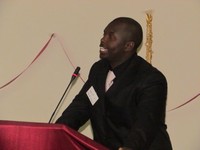 collaboration always more, also involving Sophia University Institute (Vice-chancellor Fr. John C. Maviiri attended the inauguration of Sophia).
collaboration always more, also involving Sophia University Institute (Vice-chancellor Fr. John C. Maviiri attended the inauguration of Sophia).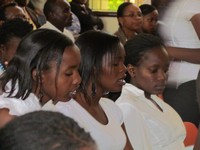 Then, in this context what stood out strongly was to understand once again that, in order for the EoC to work, it needs a direct relationship with poverty. When Chiara Lubich launched the project, touched by the crown of thorns – by the poverty of Sao Paulo and of Brazil – she called the Brazilian community mainly to do something more to resolve that scandal. So Brazil took off, poor but many, building the business park, the 100 businesses…because the EoC was linked (today, perhaps less directly even in Brazil) to an evident and direct problem of poverty. If this direct contact is missing, the EoC businesses don’t understand the meaning of what they do. Besides, it is no longer enough to gather money in Europe to use it in other parts of the world within our movement, because that link is too weak, at least as the years go by.
Then, in this context what stood out strongly was to understand once again that, in order for the EoC to work, it needs a direct relationship with poverty. When Chiara Lubich launched the project, touched by the crown of thorns – by the poverty of Sao Paulo and of Brazil – she called the Brazilian community mainly to do something more to resolve that scandal. So Brazil took off, poor but many, building the business park, the 100 businesses…because the EoC was linked (today, perhaps less directly even in Brazil) to an evident and direct problem of poverty. If this direct contact is missing, the EoC businesses don’t understand the meaning of what they do. Besides, it is no longer enough to gather money in Europe to use it in other parts of the world within our movement, because that link is too weak, at least as the years go by. 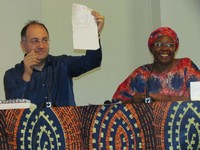 Nairobi, January 26, 2011 – Yes, yesterday the 1st Pan African EoC School concluded in Mariapolis Piero, and today, on the 30th anniversary of the death of Piero Pasolini (one of the first focolarini to bring the charism of unity to Africa) here in Nairobi, we have begin the conference at Catholic University.
Nairobi, January 26, 2011 – Yes, yesterday the 1st Pan African EoC School concluded in Mariapolis Piero, and today, on the 30th anniversary of the death of Piero Pasolini (one of the first focolarini to bring the charism of unity to Africa) here in Nairobi, we have begin the conference at Catholic University. 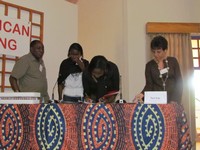 Nunciature, we presented the four sheets with signatures on the altar. Genevieve Sanze should have been the one to bring them and say a prayer during the offertory, but she asked me to do it. I was caught off guard. I tried to open my mouth to pray, and said "Lord, welcome these signatures which are the sign that we have offered our lives so that an economy of communion may spread in Africa...". But then I couldn't continue. I wasn't able to speak anymore because the emotion was so strong.
Nunciature, we presented the four sheets with signatures on the altar. Genevieve Sanze should have been the one to bring them and say a prayer during the offertory, but she asked me to do it. I was caught off guard. I tried to open my mouth to pray, and said "Lord, welcome these signatures which are the sign that we have offered our lives so that an economy of communion may spread in Africa...". But then I couldn't continue. I wasn't able to speak anymore because the emotion was so strong.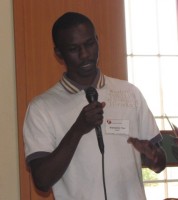 There was much love and much hope in those signatures. And I was without words, making a "great" impression in front of the Nunciature (to whom I had been presented as responsible of the project!). Anyways, even those tears produced more fraternity and equality with everyone, maybe showing that we had not gone there to speak about theories but that we felt the joys, hopes and pains of those lands on our shoulders.
There was much love and much hope in those signatures. And I was without words, making a "great" impression in front of the Nunciature (to whom I had been presented as responsible of the project!). Anyways, even those tears produced more fraternity and equality with everyone, maybe showing that we had not gone there to speak about theories but that we felt the joys, hopes and pains of those lands on our shoulders. 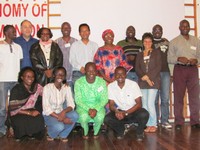 is something immense to me. They outlined some concrete projects, starting with themselves. With one business in Burundi, the Bangco Kabayan will join as partner in a micro-credit program, starting the bank's first activity outside the Philippines.
is something immense to me. They outlined some concrete projects, starting with themselves. With one business in Burundi, the Bangco Kabayan will join as partner in a micro-credit program, starting the bank's first activity outside the Philippines. 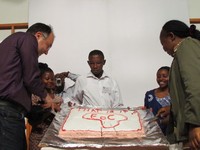 beautiful, and many of the guests contributed artistic pieces (John and his wife Julie, Giampietro, Leo and Anneke, Teresa and her husband Francis and daughter Alexandra).
beautiful, and many of the guests contributed artistic pieces (John and his wife Julie, Giampietro, Leo and Anneke, Teresa and her husband Francis and daughter Alexandra).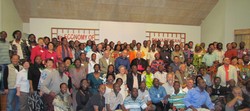 ahead by professors from our group. We must invest in Africa - there's need and enthusiasm for it. These "younger" peoples (editor's note: even if we're close to the Rift Valley) have a hunger for life and future, which is the pre-condition to understanding the EoC and, even before that, Chiara Lubich's charism of unity. If this "hunger" lacks, there is no hope that someone will understand the charism. Here, people want to live. I was touched by how much the young people here love to study. For them, getting into college is the goal of their life, because it means future. You see people studying at night, below street lamps because they have no light at home (and I thought of our young people who are often listless because they have everything, and therefore their desire is snuffed out like a candle). Without this desire and hunger for future, our movement cannot grow.
ahead by professors from our group. We must invest in Africa - there's need and enthusiasm for it. These "younger" peoples (editor's note: even if we're close to the Rift Valley) have a hunger for life and future, which is the pre-condition to understanding the EoC and, even before that, Chiara Lubich's charism of unity. If this "hunger" lacks, there is no hope that someone will understand the charism. Here, people want to live. I was touched by how much the young people here love to study. For them, getting into college is the goal of their life, because it means future. You see people studying at night, below street lamps because they have no light at home (and I thought of our young people who are often listless because they have everything, and therefore their desire is snuffed out like a candle). Without this desire and hunger for future, our movement cannot grow. 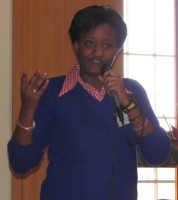 women, beautiful with a beauty that has been a lost in the West, I saw women of the Gospel and of the Bible, with their concrete love for Jesus, for the apostles and for the prophets. Africa speaks much of women (I understood why someone had proposed that the Nobel prize be given to the women of Africa!), because in them they carry the greatest wounds and the greatest blessings of these peoples (including our women focolarine).
women, beautiful with a beauty that has been a lost in the West, I saw women of the Gospel and of the Bible, with their concrete love for Jesus, for the apostles and for the prophets. Africa speaks much of women (I understood why someone had proposed that the Nobel prize be given to the women of Africa!), because in them they carry the greatest wounds and the greatest blessings of these peoples (including our women focolarine). 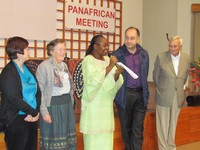 The first day of the Pan African EoC School at Mariapolis Piero has begun with much joy and with the atmosphere that grand occasions have, characterized by both seriousness and happiness at the same time. There are around 160 people present, including numerous youth, from 12 African countries. To have so many countries represented is truly an important fact in itself. You can feel the enthusiasm, and there are all the premises so that the time of the EoC in Africa may begin. After various non-formal greetings - here in African, the meeting with the other is always solemn - I gave a brief introduction. It was the result of months of preparation for this meeting, even those after I arrived in Nairobi on Saturday, with the help of a few colleagues who live their everyday lives here in Africa.
The first day of the Pan African EoC School at Mariapolis Piero has begun with much joy and with the atmosphere that grand occasions have, characterized by both seriousness and happiness at the same time. There are around 160 people present, including numerous youth, from 12 African countries. To have so many countries represented is truly an important fact in itself. You can feel the enthusiasm, and there are all the premises so that the time of the EoC in Africa may begin. After various non-formal greetings - here in African, the meeting with the other is always solemn - I gave a brief introduction. It was the result of months of preparation for this meeting, even those after I arrived in Nairobi on Saturday, with the help of a few colleagues who live their everyday lives here in Africa.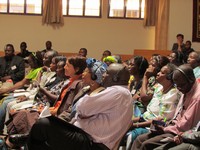 economics, which contains all the contradictions and wounds of these lands, which have been plundered of people and resources for centuries, without mercy, and which continue in this condition today. You can feel that the Africans have a great desire to "get Africa back in their own hands", and even if the Focolare Movement has behaved differently compared to others, with true efforts in inculturation and service to Africa, these wounds are even felt here in this context.
economics, which contains all the contradictions and wounds of these lands, which have been plundered of people and resources for centuries, without mercy, and which continue in this condition today. You can feel that the Africans have a great desire to "get Africa back in their own hands", and even if the Focolare Movement has behaved differently compared to others, with true efforts in inculturation and service to Africa, these wounds are even felt here in this context. 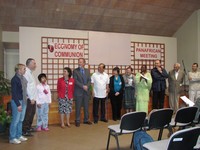 The charism is like a map that helps us face the unknown, with the serious hope of being able to find a "new world" (perhaps by looking for the Indies). But Columbus wrote his real map when he returned home. In the same way, only the Africans can bring about the African Economy of Communion. Right now, what is needed is to start with the EoC that has arisen from a charism. Then, there will be need of seamen, ships and captains, but most of all, they will need to have "nostalgia of the sea" (of a united world!), the desire to suffer, to search for a new world. If this nostalgia is missing, the boat will never set sail. Therefore: a "map" and "nostalgia of the sea".
The charism is like a map that helps us face the unknown, with the serious hope of being able to find a "new world" (perhaps by looking for the Indies). But Columbus wrote his real map when he returned home. In the same way, only the Africans can bring about the African Economy of Communion. Right now, what is needed is to start with the EoC that has arisen from a charism. Then, there will be need of seamen, ships and captains, but most of all, they will need to have "nostalgia of the sea" (of a united world!), the desire to suffer, to search for a new world. If this nostalgia is missing, the boat will never set sail. Therefore: a "map" and "nostalgia of the sea".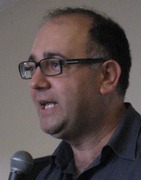 new horizons. The EoC, as we familiarly say, is alive and growing in today’s history, in the crises and hopes of our time. Chiara’s proposal to give life to business and business parks, and then (in May of 1998) to a cultural movement that would give “scientific dignity” to the praxis in place, did not fall on deaf ears. It was embraced by thousands of people, mostly within but more recently even outside of the Focolare Movement – a diverse people united by the desire to cultivate the earth so that the seed of the charism of unity, thrown on the terrain of modern economy, grows according to the laws written in its DNA and brings fruits typical of the charism given to Chiara, as a gift for humanity today and tomorrow.
new horizons. The EoC, as we familiarly say, is alive and growing in today’s history, in the crises and hopes of our time. Chiara’s proposal to give life to business and business parks, and then (in May of 1998) to a cultural movement that would give “scientific dignity” to the praxis in place, did not fall on deaf ears. It was embraced by thousands of people, mostly within but more recently even outside of the Focolare Movement – a diverse people united by the desire to cultivate the earth so that the seed of the charism of unity, thrown on the terrain of modern economy, grows according to the laws written in its DNA and brings fruits typical of the charism given to Chiara, as a gift for humanity today and tomorrow. statute last-resort lenders, that is, in the case of speculative attacks, in serious crisis of the state, they must intervene with reserves to avoid accumulative effects (just remember what happened in Italy in 1993 when Ciampi was governor of the Bank of Italy and had to resort to inflation of the Lira).
statute last-resort lenders, that is, in the case of speculative attacks, in serious crisis of the state, they must intervene with reserves to avoid accumulative effects (just remember what happened in Italy in 1993 when Ciampi was governor of the Bank of Italy and had to resort to inflation of the Lira).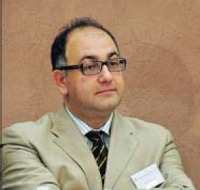 Do you see anything else underneath this crisis?
Do you see anything else underneath this crisis? 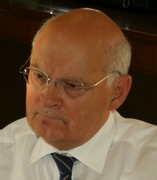 economists have substantial moral responsibility because the error is in "theoretical planning". They supposed that in practice, financial risk was "exogenous" by nature, that is, that with an increase in transactions the risk would be nullified. But even a first-year economy student knows that risk is "endogenous" in nature: it increases with an increase in transactions!
economists have substantial moral responsibility because the error is in "theoretical planning". They supposed that in practice, financial risk was "exogenous" by nature, that is, that with an increase in transactions the risk would be nullified. But even a first-year economy student knows that risk is "endogenous" in nature: it increases with an increase in transactions! 